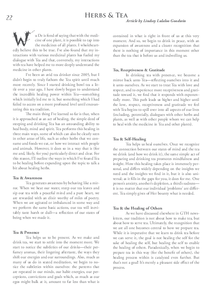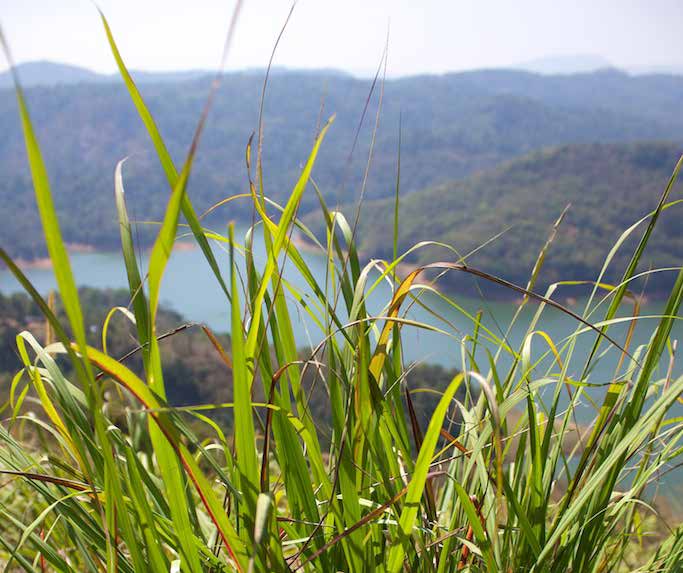
 |
|
Wu De is fond of saying that with the medicine of one plant, it is possible to tap into the medicines of all plants. I wholeheartedly believe this to be true. I've also found that my interactions with various medicinal plants has fueled my dialogue with Tea and that, conversely, my interactions with tea have helped me to more deeply understand the medicine in other plants.

I've been an avid tea drinker since 2005, but I didn't begin to truly fathom the Tea spirit until much more recently. Since I started drinking bowl tea a little over a year ago, I have slowly begun to understand the incredible healing power within Tea - something which initially led me to it, but something which I had failed to access on a more profound level until encountering this tea tradition.
The main thing I've learned so far is that, when it is approached as an act of healing, the simple deed of steeping and drinking Tea has an astounding ability to heal body, mind and spirit. Tea performs this healing in three main ways, some of which can also be clearly seen in other areas of life, such as other herbs that we consume and foods we eat, or how we interact with people and animals. However, it does so in a way that is (for me and, likely, for you) particulary direct and clear. For this reason, I'll outline the ways in which I've found Tea to be healing before expanding upon the topic to talk a bit about healing herbs.
Tea generates awareness by behaving like a mirror. When we heat our water, steep our tea leaves and sip our tea with a peaceful mind and a pure heart, we are rewarded with an elixir worthy of miles of poetry. When we are agitated or imbalanced in some way and we perform the same basic actions, our tea will inevitably taste harsh or dull - a reflection of our states of being when we made it.
Tea helps us to be present. As we make and drink tea, we start to settle into the moment more. We start to notice the subtleties of our drinks - their perfumey aromas, their lingering aftertaste, the ways they shift our energies and our surroundings. Also, much as many of us do in seated meditation, we begin to notice the subtleties within ourselves: the patterns that are repeated in our minds, our habit energies, our perceptions, convictions and goals which, as much as our egos might balk at it, amount to far less than what is contained in what is right in front of us at this very moment. And so, we begin to drink in peace, with an expansion of awareness and a clearer recognition that there is nothing of importance in this moment other than the tea that is before us and indwelling us.
In drinking tea with presence, we become a mirror back unto Tea - reflecting ourselves into it and it unto ourselves. As we start to treat Tea with love and respect, and to experience more receptiveness and gratitude toward it, we find that it responds with exponentially more. This path leads us higher and higher until the love, respect, receptiveness and gratitude we feel with Tea begins to spill over into all aspects of our lives (including, potentially, dialogues with other herbs and plants, as well as with other people whom we can help to heal with the medicine in Tea and other plants).
Tea helps us heal ourselves. Once we recognize the connection between our states of mind and the tea we drink (and how we drink it), the same simple act of preparing and drinking tea promotes mindfulness and insight. How this healing takes place is immensely personal, and differs widely depending on the insights we need and the insights we find in it, but it is also universal; as it fills in the gaps for you, it does for me. One person's anxiety, another's depletion, a third's sadness - it is no matter that our individual 'problems' are different. Tea simply gives of Her bounty what is needed.
As we have discussed elsewhere in GTH newsletters, our tradition is not about how to make tea, but about how to serve tea. Ultimately, the recognition that we are all one becomes central to how we prepare tea. While it is imperative that we learn to drink tea before we can serve it, the goal is not healing the self for the sake of healing the self, but healing the self to enable the healing of others. Paradoxically, when we begin to prepare tea in this way (for the benefit of others), the healing process within is catalyzed even further. But that's not a goal! It's merely a pleasant side effect of the process.
Like Tea, herbs are not usually medicine in the "take remedy x, fix problem y" mentality with which so many people approach medicine today. Rather, Tea and herbs are medicine in the sense that they are substances which place us in harmony with Nature and with all that is - a far deeper healing than one could ever hope to gain from a pill! In beginning to understand this, I've recently begun a heart-to-heart with several types of herbs akin to my more longstanding communion with Tea. While I've only just begun this exploration, I'd like to share what I've learned with you and to ask that those of you with deeper insights share your understandings in the form of an article for these newsletters or in the form of a conversation the next time we catch up in Taiwan or elsewhere in the world.
Let's start with awareness and presence (Never a bad place to start!). It is certainly possible to add an element of ceremony to your use of herbs (as many shamanistic traditions do), increasing awareness and presence through the aid of ritual. This can be one way to sidestep the Western concept of 'fixing' a problem and move towards a more holistic understanding of herbs as medicine, and towards a more harmonious state of being. Personally, I find that using herbs in the forms of topically applied essential oils or bath sachets can be great ways to do this. Some herbs (like the Snow Chrysanthemum) are even better when they are drunk like tea, and this is also a wonderful way to generate presence through herbs, and to better understand and interact with herbs as healing agents.
Similarly, cultivating receptiveness and gratitude toward herbs helps us tap into the vast healing potential they have to offer. You probably wouldn't walk up to a great healer and say, "Hey, you! Fix my problem right now." Yet so many of us do this with plants all the time, be it in the way we purchase foods ("Now with spirulina!") to the way we select products such as shampoo ("Strengthens hair with pomegranate and grape seed extracts!"). When we approach herbs (or foods, or pretty much anything for that matter) without receptiveness and gratitude, we don't get much in return. But when we open ourselves to the healing capacity of herbs Herbs & Tea 24and thank them for what they give, we are able to access a much deeper level of healing.
This can be seen in many ways, both experiential and scientific. As I've already mentioned, the experiential lesson of receiving and being thankful for Tea is an accessible aspect of Tea's healing. The same is true of herbs. Recently, I was sick with a cough and cold, and Wu De boiled some Puerh with Snow Chrysanthemums for me. In addition to his act of aware and present tea preparation, there were elements of my own receptiveness and gratitude that played a large role in the herb's healing effects. Had I simply bought a pill and swallowed it
without a second thought, would I have experienced the same kind of healing as I did from sitting around with my teacher and my tea brothers here at the center, meditating and celebrating over bowls of awe-inspiring tea? I doubt it, and so does the scientific community. It turns out that not only does the consumption of hot beverages foster healing for many ailments; a positive of community and the act of tasting a substance (rather than swallowing it as a pill) both promote overall wellness and the physical healing process.
While the above aspects of healing with herbs relate in a fairly straightforward way to the healing process of Tea, I find that for the third mechanism by which Tea heals (facilitating self-healing), herbs differ a bit from Tea. Tea is an incredibly versatile healing agent capable of addressing a wide range of conditions, be they of the body, mind, heart or spirit. Few herbs can compare to the adaptability and gentleness of Tea (though tulsi/Holy Basil and a few others are known for their panacea-like curative properties).
For this reason, I find that it's helpful to know something of the traditional uses and precautions surrounding a given herb before you start to use it for healing. However, there's still much to be learned from communicating with herbs as you would with Tea.
Learning to understand the language of plants in general is conducive to self-healing with herbs, and it feeds back into your tea practice. You could think of it as learning to speak a specific dialect of a specific language (Tea/modern English) versus learning to speak a root language (Plant/Latin). Fluency in the specific language accelerates the understanding of the root language, and absorption of the root language enriches insights about the specific language. In this way, experiential understanding of herbs can benefit our tea practices, and a strong tea practice can stimulate intuition about the use of other herbs.

The specificity of the healing capabilities of herbs also makes healing others with tea a little different from healing others with herbs. Given the different structure of rewards and potential dangers, I certainly don't recommend going around prescribing powerful herbs to people without caution. That said, if you can open up a non-verbal dialogue with plants and with other people, there is enormous potential for healing others with herbs. A few things that have helped me explore the capacities of herbs include:
* Listening to the plants by myself first, taking the time to get a feel for them before serving them to others * Playing around with preparation methods (such as steeping vs. boiling or different water-to-herb ratios) to see what each herb prefers * Limiting the types of herbs I use to gain greater insights into what they offer * Making the herbs I use communal property of the tea center rather than "my" herbs * Taking a pulse on the people for whom I'm preparing herbs, noting the mood of the person / group, the time of day, the weather, etc. before making a selection * Being receptive to what the herbs tell me and being thankful for what the herbs have to offer
Snow Chrysanthemum, We thank you for your heat. You rose from the frozen mountaintops, Ablaze in scarlet and saffron hues, To warm our bodies, To melt any coldness in our hearts, And to burn away the ego Which gives us the illusion of separation. For this, we offer our thanks.
Oh, Great Tea Goddess, You are the sublime hidden in the mundane, The intersection of the earthly and the divine. We thank you for all that you give to us, Expecting nothing in return. May we receive your wisdom in each sip, In each steeping of your leaves, In each breath of your rising steam. May we share your blessings with others, And heal within by healing without, Recognizing through You that all is one.